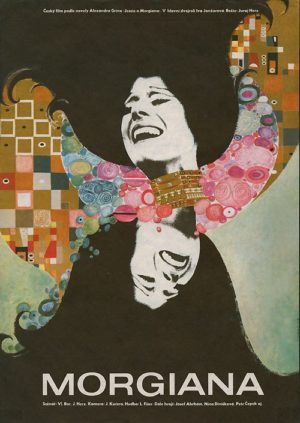 A memorable exercise in gothic excess from the noted Czech filmmaker Juraj Herz. Fabulously baroque visuals and a deliriously melodramatic storyline make for an interesting and enjoyable film that unfortunately falls apart in the end.
A memorable exercise in gothic excess from the noted Czech filmmaker Juraj Herz. Fabulously baroque visuals and a deliriously melodramatic storyline make for an interesting and enjoyable film that unfortunately falls apart in the end.
Although its director Juraj Herz never aligned himself with his country’s cinematic “New Wave”, MORGIANA (1971), with its unprecedented, near experimental visuals, is often cited as the “last” film of the Czech New Wave (a movement that included films like DAISIES, THE FIREMEN’S BALL and THE JOKE). Herz is best known for his expressionistic black comedy THE CREMATOR (SPALOVAC MRTVOL; 1968), which contained quite a few horrific touches. Both it and MORGIANA are visual marvels that were quite controversial in their native land, so much so that Herz claims he was forbidden to make features for two years following the completion of the latter film.
MORGIANA, based on a short story by Alexandr Grin, the “Russian Edgar Allen Poe,” was apparently conceived quite differently than it turned out. Herz’s conceit of having one actress, Iva Janzurova, play two roles was apparently due to the fact that her characters were originally intended as different facets of a single person. This would have altered the intent of the film quite radically, but government-appointed regulators took issue with that interpretation and forced Herz to make a film he admits he “didn’t like.” Unwanted outside interference is a problem that has dogged Herz throughout his career, but he’s managed to turn out some interesting films all the same, even if he himself disagrees.
In an unidentified 19th Century setting of decadent opulence two sisters, the vivacious blonde Klara and the pouty brunette Viktoria, find themselves graced with abundant wealth inherited from their recently deceased father. Viktoria, the bad sister, grows increasingly jealous of the good Klara’s inheritance of their family house and the fact that she’s far more popular with the local men. Viktoria decides to poison her sister, an act far more complicated than she originally anticipated: the poison turns out to be a slow acting one which somehow manages to spread to much of the surrounding population, including Morgiana, Viktoria’s cat. Worse, the spiteful woman who sold Viktoria the poison decides to blackmail her…and won’t be silenced, even after Viktoria pushes her off a cliff!
Klara, meanwhile, finds herself drifting into an increasingly hallucinatory reality. She thinks her sister might be responsible, but can’t tell if her suspicions are real of just more hallucinations. Eventually she expires…or seems to, at any rate. Viktoria decides to stage her own suicide by hanging, planning it so she’ll be saved at the last minute by her maid; her none-too-loyal cat Morgiana thwarts her plan, however. This leads to a lame happy ending, which posits the poison that set things in motion wasn’t “really” a poison.
It’s the delirious visuals conjured by Juraj Herz and cinematographer Jaroslav Kucera (DAISIES) that give this film its kick. The color scheme is a gaudy one and the ever-fluid camerawork is extremely expansive and even show-offy, particularly the cat POV shots in which the camera darts and jumps. The outrageousness of the enterprise is completed by Herz’s preference for extreme wide-angle lenses.
Also striking are the psychedelic POV shots representing the poisoned Klara’s druggy universe, where shades of red clash with black and white. Credit must be given Iva Janzurova’s duel performances that often have her interacting with herself. Outfitted entirely in black and sporting Cruella De Ville-like eye make-up and incredibly long lashes, she’s quite a sight as Viktoria the evil sister, and even loses her brunette wig toward the end to reveal a mop of patchy, balding hair. Lubos Fiser’s noisy, insistent music score also aids immeasurably in creating an atmosphere of melodramatic delirium. Again, however, the ending could really use some work.
Vital Statistics
MORGIANA
Filmove Studio Barrandov
Director: Juraj Herz
Screenplay: Valdimir Bor, Juraj Herz
(Based on a story by Alexandr Grin)
Cinematography: Jaroslav Kucera
Cast: Iva Janzurova, Josef Abrham, Nina Diviskova, Petr Cepek, Josef Somr, Jiri Kodet, Jiri Lir, Ivan Paluch, Zuzana Fisarkova, Marie Drahokoupilova, Jana Sedlmajerova, Karel Augusta
